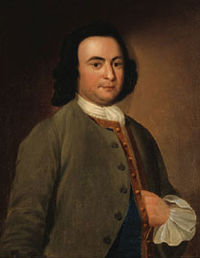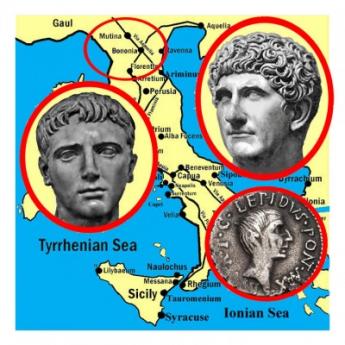Related Topics
..The Constitution
Our Constitution was not a proclamation written by a convention. It was a negotiated contract for uniting thirteen sovereign independent states. Nothing like that had ever been done voluntarily, and few nations have matched it in two hundred years, even with the use of force.
Government Organization
Government Organization
Right Angle Club: 2013
Reflections about the 91st year of the Club's existence. Delivered for the annual President's dinner at The Philadelphia Club, January 17, 2014.
George Ross Fisher, scribe.
George Mason and Triumvirates

|
| George Mason |
George Mason was George Washington's neighbor in Virginia, a good friend, and an important contributor to the Constitutional Convention, once he got there. There was every reason to think he would be an enthusiastic supporter of the document, but at the end of the Convention, he refused to sign it. Various explanations for his behavior have been offered, but one that might be considered is that he offered a proposal to have the President be replaced by three people, one from the North, one from the South, and one to be drawn from the middle colonies. He was pretty passionate about his idea for a triumvirate, so passionate it rises to the level of a possible explanation for his refusing to sign.
We have not yet been able to define the Power of the Executive; and however moderately some Gentlemen may talk or think upon the subject, I believe there is a general Tendency to a strong Executive and I am inclined to think a strong Executive necessary. If Strong and extensive Power is vested in the Executive, and that Executive consists only of the one Person, the Government will of course degenerate, (for I will call it degeneracy) into a Monarchy-- A Government sop contrary to the Genius of the People, that they will reject even the Appearance of it. I consider the Federal Government as in some Measure dissolved by the Meeting of this Convention. Are there no Dangers to be apprehended from procrastinating the time between the breaking up of this Assembly and the adoption of a new System of Government. I dread the Interval. If it should not be brought to an issue in the Course of the first Year, the Consequences may be fatal. Has not the different Parts of this extensive Government, the several States of which it is composed a Right to expect an equal Participation in the Executive, as the best Means of securing an equal Attention to their Interests. Should an Insurrection, a Rebellion or Invasion happen in New Hampshire naturally ascribe any Delay in defending them to such a Circumstance and so vice versa. If the Executive is vested in three Persons, one chosen from the Northern, one from the middle, and one from the Southern States, will it not contribute to quiet the Minds of the People, and convince them that there will be proper attention paid to their respective Concerns? Will, not three Men so chosen bring with them, into Office, a more perfect and extensive Knowledge of the real Interests of this great Union? Will not such a Model of Appointment be the most effectual means of preventing Cabals and Intrigues between the Legislature and the Candidates for this Office, especially with those Candidates who from their local Situation, near the seat of the Federal Government, will have the greatest Temptations and the greatest Opportunities. Will it not be the most effectual Means of checking and counteracting the aspiring Views of dangerous and ambitious Men, and consequently the best Security for the Stability and Duration of our Government upon the invaluable Principles of Liberty? These Sir, are some of my Motives for preferring an Executive Consisting of three Persons rather than one

|
| Marc Antony, Lepidus, and Octavius Caesar |
The Constitutional Convention has been described as being strongly influenced by the Senate of ancient Rome, and Shakespeare's depiction of it was very popular in the colonies. It, therefore, seems strange that Mason would be so strongly attracted to a form of government which attended the dissolution of the Roman Senate, and the long reign of Emperors which followed it. The first triumvirate lasted only five years and consisted of Julius Caesar, Pompey, and Crassus. With Caesar's move toward the throne, this particular triumvirate did not come out to what would have been the American colonist wishes. The second triumvirate also only lasted five years, consisting of Marc Antony, Lepidus, and Octavius Caesar. Shakespeare tells us in no uncertain terms that did not work out. In both cases, two of the three went to war with each other but first disposed jointly of the third. Mason does not mention the Roman examples, perhaps because they posed inconvenient outcomes. Perhaps this tobacco farmer was not sufficiently learned about Rome, but it is also possible that he was thinking of the three centuries of Roman history where there was a succession of Emperors, mostly bad ones. During that period, Rome was really ruled by many triumvirates with subordinate absolute powers, specifically denominated. Essentially this was an organized aristocracy and it supposedly worked pretty well. And perhaps George Mason just secretly disliked Washington or feared tendencies he was close enough to know about. Or maybe six other things. We certainly can be sure the rest of the convention knew some Roman history, and definitely did not want to see either a King or an Aristocracy. No matter how gentle and persuasive, one of their esteemed colleagues might be about it.
Originally published: Saturday, June 29, 2013; most-recently modified: Monday, May 20, 2019